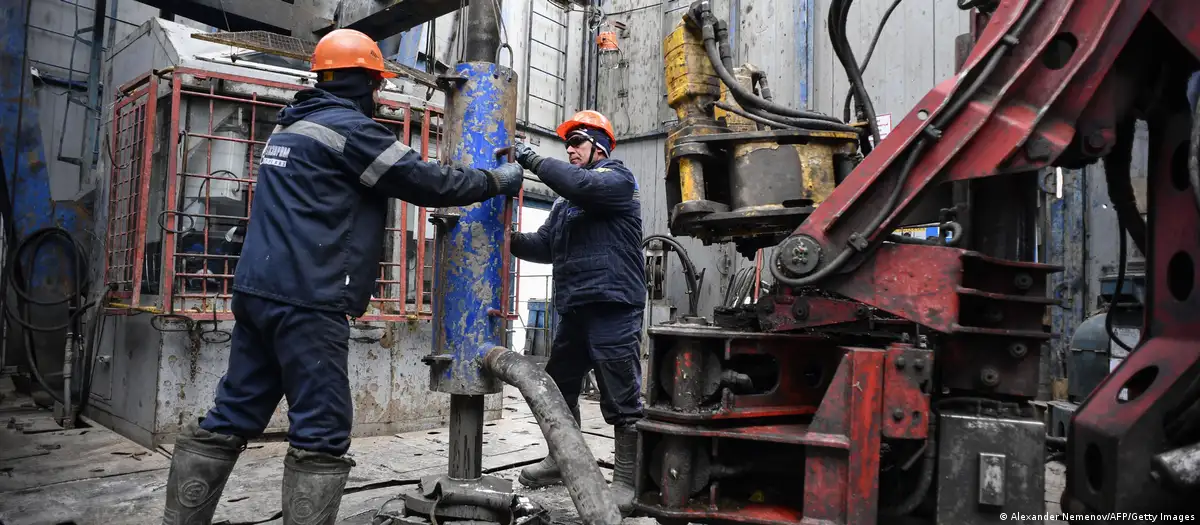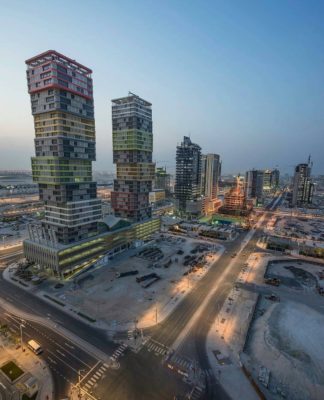BUSINESSGLOBAL ISSUES
UN calls for pay cap for workers in ‘destructive industries’
Kristie Pladson
8 hours ago8 hours ago
Wages should reflect what a worker contributes to society, the UN has said, calling on governments to intervene. One in five workers globally is living in poverty.
https://p.dw.com/p/4XlSV
Employees work at a gas drilling rig at the Bovanenkovo gas field on the Yamal peninsula in the Arctic circle on May 21, 2019
A UN report is calling for caps on pay for workers in “destructive industries,” like oil and gas drilling.Image: Alexander Nemenov/AFP/Getty Images
Essential workers in fields like health care and sanitation should earn higher wages, and governments should cap pay in destructive industries like finance trading and fossil fuel excavation. That’s the call to action of a new report on the working poor released Friday by the United Nations.
“It is time to flip this injustice on its head,” UN Special Rapporteur on extreme poverty and human rights, Olivier De Schutter, said in a press release.
“Governments should draw up lists of the most socially valuable professions and pay them accordingly, while also listing the professions where pay should be capped to mitigate their harmful side effects.”
A health worker is seen as people are getting vaccinated against Covid -19, at the Heitor Beltrao health unit, central area of the city, in Rio de Janeiro, Brazil on July 20, 2022.A health worker is seen as people are getting vaccinated against Covid -19, at the Heitor Beltrao health unit, central area of the city, in Rio de Janeiro, Brazil on July 20, 2022.
Nursing and other types of care work tend to be undercompensated relative to how important they are to societyImage: Fabio Teixeira/AA/picture alliance/dpa
20% of global workers live in poverty
According to the latest findings, one in five workers in the world is living in poverty.
“Most of the world’s poor people work, yet they do not earn a wage sufficient to afford an adequate standard of living for themselves and their families,” the introduction to the report reads.
Many of the workers in jobs that society relies on to function, such as food production, transport, cleaning and sanitation, are earning the minimum wage in their country, the report says. This is often not enough to keep these workers out of poverty, especially in the face of soaring inflation and stagnating wage growth.
Global monthly wages fell in real terms by 0.9% in the first half of 2022, the UN found — the first global wage decline this century.
An Indian manual scavenger looks up as he cleans a manhole in the old quarters of New Delhi on March 21, 2018 An Indian manual scavenger looks up as he cleans a manhole in the old quarters of New Delhi on March 21, 2018
Informal working conditions have weakened collective bargaining efforts over the last 20 to 30 yearsImage: CHANDAN KHANNA/AFP/Getty Images
Gig economy weakens bargaining power
Over the past 20 years, workers have seen a weakening of the ability to fight for better wages, De Schutter says. More and more workers have “flexible” or temporary contract conditions, sometimes called being part of the “gig economy.” These substandard contracts and worker isolation make it harder for unions to mobilize and fight for better pay.
There is also the constant threat that employers will look to produce elsewhere in low-wage jurisdictions, which cripples employees’ ability to bargain.
“There’s a global competition, in which governments take part, leading to a race to the bottom in the area of how wages are set,” De Schutter told DW in a call. “There is no future for countries who bet their comparative advantage in this global competition on keeping their workers in poverty.”
Progress on reducing poverty and hunger ‘has been reversed’
03:43
Minimum wage doesn’t always equal a living wage
International human rights law guarantees workers the right to pay which provides them, as a minimum, with fair wages and a decent living for themselves and their families.
“The persistence of in-work poverty can be attributed to violations of these guarantees,” the UN report notes.
For example, the minimum wage in many countries is not keeping pace with the true cost of living. In China, a monthly minimum wage can range from $240 (€226) to $380, but estimates show that “a true living wage” for a single Chinese adult would range from $360 to $585.
According to the UN report, a living wage would need to provide a worker and their family with a decent standard of living, or correspond to at least 60% of the median wage in the country, whichever is highest.
“Governments should stop believing in this fiction that wages are set as a result of supply and demand curves meeting on an equilibrium point in the labor markets,” said De Schutter.
A Russian trader monitors the markets inside a private international investment banking firm in Moscow on October 9, 2008A Russian trader monitors the markets inside a private international investment banking firm in Moscow on October 9, 2008
High wages in fields like stock trading don’t align with what would serve societyImage: Getty Images/AFP/A. Sazonov
Harmful sectors should be less lucrative
Workers tend to be rewarded for the economic value they create rather than what they contribute to society. This is particularly true of care work, which historically was performed by women within households, without pay. This worldview is one factor keeping wages for essential workers down.
“Instead of designing schemes to help people in poverty, economists will become traders; instead of producing food for the community, farmers will produce cash crops for which there is a demand on the high-value markets of rich countries,” the report says.
“My call is to governments to remedy this,” De Schutter told DW, “and to ensure that teachers, nurses, health care providers are much better paid, and put a cap on the wages paid in the most toxic industries, such as fossil energy trading or advertising.”
Edited by: Uwe Hessler

























![How to get a Qatar Family Residence Visa? [ Updated ]2022](https://welcomeqatar.com/wp-content/uploads/2022/04/maxresdefault-2-324x400.jpg)




